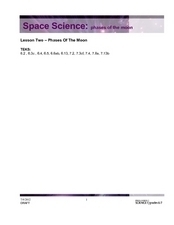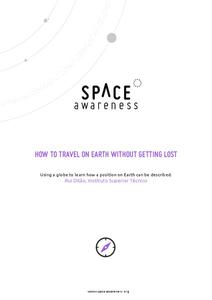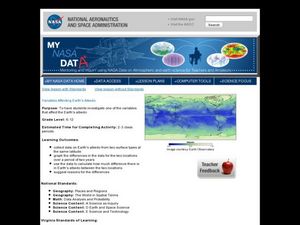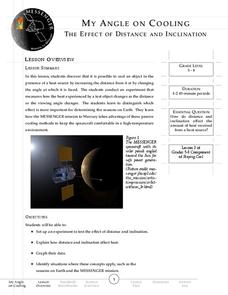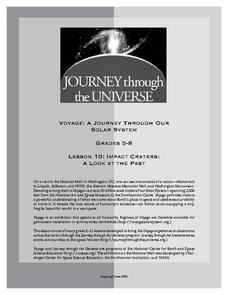California Academy of Science
Kinesthetic Astronomy: Earth's Rotation
After completing the activity, "Kinesthetic Astronomy: The Meaning of a Year," zoom in on Earth's rotation using the same simulation setup and this outline. Each class member dons a map of the Western Hemisphere and plays the part of...
Curated OER
Space Science: Adventure is Waiting
These full-color handouts feature two activities. The first is a reading on comets, meteors, and meteoroids. Your space science learners will examine ten phrases and determine which of the three each characterizes. The second activity...
Curated OER
Space Science: Phases of the Moon
Looking for a terrific instructional activity on the phases of the moon that has lots of good worksheets? With two excellent websites are embedded in the plan, the activity is sure to spark some interest in your astronomy unit. Some...
BioEd Online
Muscles and Bones in Space
Being an astronaut takes not only high mental acuity, but also a high level of physical fitness, especially for those who spend a long amount of time away from Earth, such as the astronauts serving on the International Space Station....
PHET
Radiation Hazards in Space
Young scientists race from Earth to Mars and back, trying to complete mission objectives while avoiding radiation in this game for 2-4 players. To identify the winner, players must graph their mission points and radiation points at the...
National Science Teacher Association
Middle School Sampler: Science
Focus on inquiry-based learning in your science class with a series of activities designed for middle schoolers. A helpful packet samples four different texts, which include activities about predator-prey relationships, Earth's axis...
Curated OER
Living On Earth
Students discover the many different animals within various habitats and discover how each individual species interacts with its particular environment. Through charting different animals and their distinct habitat and matching animals...
Space Awareness
How To Travel On Earth Without Getting Lost
Have you ever wanted to travel the world? Take a virtual trip with a geography lesson that uses longitude and latitude, the position of the sun, an astronomy app, and a classroom globe.
Curated OER
Suited for Space
A fantastic lesson on survival in outer space should excite your learners! Pupils explore the challenges that living, working, and surviving in space elicit. They focus on the spacesuit itself; how it protects astronauts, and enables...
Laboratory for Atmospheric and Space Physics
Space Travel Guide
Looking to take a trip? Why not go to space? Here, scholars take on the role as travel agent to create a guide to their favorite planet including travel tips and sightseeing recommendations.
Scholastic
Lesson One: The Earth, Background and Glossary
How much do you really know about our planet? Middle schoolers build up their prior knowledge about Earth, its placement in the solar system, its composition, and important geological vocabulary with an introductory earth science lesson.
University of Colorado
Spacecraft Speed
Space shuttles traveled around Earth at a speed of 17,500 miles per hour, way faster than trains, planes, or automobiles travel! In the 13th installment of 22, groups graph different speeds to show how quickly spacecraft move through...
Scholastic
Lesson Three: The Earth, Movement in Space
If you feel like you're standing still, you're wrong! The Earth is constantly rotating and orbiting under our feet. Demonstrate the Earth's movement within the solar system with a collaborative activity. With a candle or lamp in the...
Curated OER
Earth from Space Maps
Students use photo images from space to create a large map of the United States or the world, find where they live and label other places they know. They are exposed to a Web resource that allows them to view photo images of Earth taken...
Curated OER
Variables Affecting Earth's Albedo
Students study the variables that affect the Earth's albedo. In this environmental data analysis lesson students interpret and graph information and calculate changes.
PHET
Learning about Space Weather
Is the sun the only celestial body with magnetic fields? A guided discussion on the weather in space is designed with a mix of questions, discussions, explanations, and applications. Additionally, the resouce includes an...
Laboratory for Atmospheric and Space Physics
Planetary Distances on the Playground
There's no need to stay inside; get out of the classroom and create a scaled map of the solar system on your playground field! In collaborative groups, scholars identify the distance between the sun and other planets, place planet...
US Environmental Protection Agency
Sea Level: On the Rise
With the global temperature on the rise, the effects of climate change are starting to be seen. However, many people have a difficult time conceptualizing the long-term effects, such as sea levels rising. Given an easy and effective...
Space Awareness
Climate Zones
The climate at the equator is hotter than the climate at the poles, but why? The lesson goes in depth, explaining how the angles of illumination relate to the heating rate at different latitudes and seasons. Scholars use a strong lamp,...
Curated OER
Regolith Formation
Students explain the difference between regolith formation on Earth and the Moon. In this space science lesson plan, students model the different factors affecting regolith formation on Earth. They identify the different types of...
Curated OER
Technology for Studying Comets
Students design an Aerogel model to capture clay particles. In this space science lesson, students discover what happens to comets as they hit a surface. They explain how the Aerogel technology would help scientists study comets better.
Messenger Education
My Angle on Cooling—Effect of Distance and Inclination
When exploring Mars, spacecrafts are exposed to 5-11 times more sunlight than when near Earth. Groups of pupils complete a hands-on activity to explore how distance and angle of the sun affect temperature. Through discussions, they then...
Journey Through the Universe
Impact Craters: A Look at the Past
The Galle crater on Mars is also known as the Happy Face crater because of its appearance. First, scholars use pebbles and flour to simulate craters and study their properties. They then apply this knowledge to help decipher the history...
University of Colorado
Space Travel Guide
Neptune takes 164.8 Earth years to travel around the sun. In the fifth of 22 lessons, young scientists create a travel guide to a planet in our solar system. They provide tips for others on what to bring, what they see, and their...


